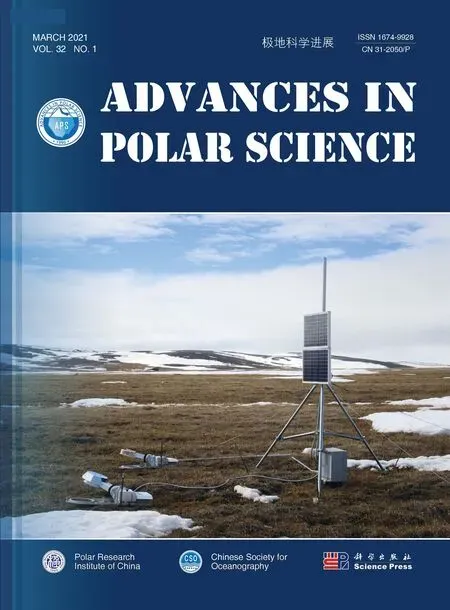Editorial Note
2021-11-12HuigenYang
Editorial Note
(APS) was founded in 1990 as a peer-reviewed, English-language journal on multi-disciplinary achievements and advances in Arctic and Antarctic science. It was originally titledbut, aiming to be more international, it was renamed with the current title in 2011.
In 2015, APS was fortunate and honored to have Dr. Ian Allison from Australia accept appointment as the co-Editor-in-Chief. Since then, the journal has recruited a truly international team of Associate Editors, which now includes 28 active scientists from China and 8 other countries. Under Dr. Ian Allison’s great leadership and sustained reforms, the journal has grown considerably with a profound increase in science quality and impact over the past six years.
APS formulated a visionary goal and road map in 2015 to be an international polar science journal that also provided special support to earlier career scientists and emerging polar research countries. It has successfully provided this special support since then. APS has also reformed its submission and review stream line to shorten its fastest manuscript review and acceptance procedure to 60 days. During this period, APS has published 12 thematic special issues to provide timely coverage of emerging scientific topics and international cooperation in the polar regions, such as “A decade of exploration and scientific research at Dome A”. Dr. Ian Allison has also created a new category of paper, the Opinion Editorial (Op-Ed), to advocate new methodologies, technologies and achievements in polar research and to communicate scientific concerns on emerging polar issues.
APS has aimed to meet top international standards. The rejection rate has increased year by year, from 5% in 2015 to 24% in 2020. Its content has considerably internationalized. Published papers with a non-Chinese submitting author have increased from 24% (with contributions from 4 other countries) in 2015 to 63% (from 14 other countries) in 2020. APS was accepted for inclusion in CSTPCD (Chinese Scientific and Technical Papers and Citations Database), CSCD (Chinese Science Citation Database), and the international Scopus abstract and citation database (Elsevier), in 2017, 2018, and 2020, respectively.
In 2020, APS celebrated its 30th anniversary since foundation. By the end of 2020, APS had published 81 issues (including 19 special/thematic issues) with a total of 767 papers. The authors of these papers come from 30 nations: Argentina, Australia, Belarus, Belgium, Brazil, Canada, Colombia, Chile, China, Denmark, France, Finland, Germany, Iceland, India, Japan, Malaysia, New Zealand, Norway, Russian Federation, Spain, South Korea, Sweden, Switzerland, the Netherlands, Turkey, Uruguay, UK, USA, and Venezuela.
Prof. Allison will retire as EiC and from 1 May 2021, Dr. Ad Huiskes, a biologist from the Netherlands and an Associate Editor of APS since 2015, will replace him as the co-Editor-in-Chief. The Editorial Board will be renewed in 2021. It will be the great honor and pleasure of the Editorial Board to work with the new EiC, Dr. Ad Huiskes. Prof. Ian Allison will continue to support the journal as an Associate Editor in the coming years.
I sincerely believe that under the leadership of Dr. Ad Huiskes, and with the continuing efforts of all editors and the Editorial Office, APS will approach its goal as a worldwide recognized academic journal, consistently publishing excellent articles that are scientifically sound and responding to societal needs in the polar regions and globally.
March 2021
Dr. Huigen Yang, co-Editor-in-Chief
杂志排行
Advances in Polar Science的其它文章
- Information for authors
- Assessment on India’s involvement and capacity-building in Arctic Science
- Complete genome analysis of bacteriochlorophyll a-containing Roseicitreum antarcticum ZS2-28T reveals its adaptation to Antarctic intertidal environment
- Leveraging the UAV to support Chinese Antarctic expeditions: a new perspective
- Seabird and marine mammal at-sea distribution in the western Bering Sea and along the eastern Kamtchatka Peninsula
- Biomarker records of D5-6 columns in the eastern Antarctic Peninsula waters: responses of planktonic communities and bio-pump structures to sea ice global warming in the past centenary
